JAKOV SEDLAR was born in Split on November 6, 1952. In 1972, he moved to Zagreb, where he studied Yugoslav languages, literature and philosophy at the Faculty of Philosophy. After his graduation in 1977, he enrolled in the Academy of Dramatic Arts and studied theatre and film directing. He graduated in 1981.
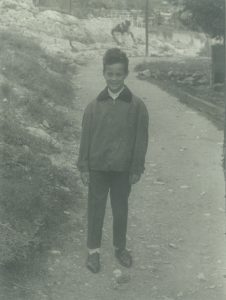
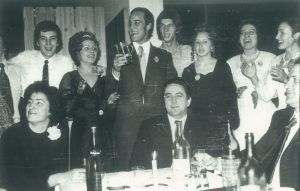
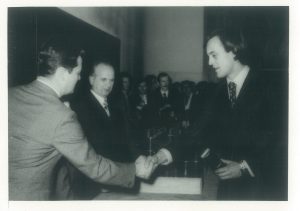
He started to play water polo in Split in 1966 and soon became a member of Jadran’s first team and a candidate for the national team. He played 34 games for the Yugoslav youth national team. In 1972 he transferred from “Jadran” to Zagreb-based “Mladost”, the world’s best water polo club at the time (team members: Stipanić, Bonačić, Lopatny, Poljak…). As the club in Split refused to give him a discharge letter (he would have had no problem obtaining the letter had he accepted the offer to play for any Belgrade-based club), he was not allowed to play in the Yugoslav water polo league for three years. During that time, Sedlar was allowed to play only international games; in 1975, he won the LEN Cup Winners’ Cup with Mladost and the Super Cup (winning against Belgrade-based “Partizan” in Ljubljana 11:10), which was in effect the water polo world champion title. Sedlar ended his sports career in 1989.
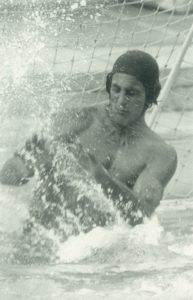
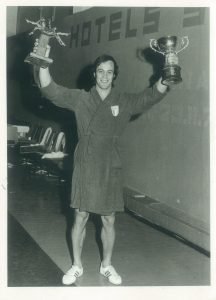
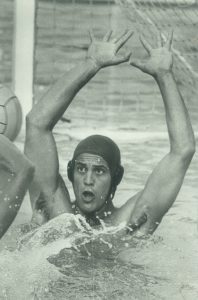
In 1992, the most famous Croatian theatre director and newly elected director of the Croatian National Theatre in Zagreb, Georgij Paro, appointed Sedlar drama director. During his four-year-term the repertoire included plays by Shakespeare, Moliere, Krleža, Brešan, Ostrovski, Marinković, Goldoni…, directed by renowned Croatian directors like Kosta Spajić, Georgij Paro, Božidar Violić and Ivica Kunčević… He took the drama ensemble on three world tours (Europe, USA and Canada, South America, Africa, Australia, New Zealand).
In 1996, the first Croatian President Dr. Franjo Tuđman persuaded him to accept the post of the first cultural attaché in the US (New York), where he remained until 2000. During that time, he launched various projects and organized numerous events to promote Croatian culture.
After his return from the USA, the newly elected left-coalition government saw to it that he was demoted to the post of cashier. Today, he is employed as media consultant at the Croatian National Theatre in Zagreb.
In the course of his rich career Sedlar directed 37 plays in professional theatres and ensembles in Zagreb, Dubrovnik, Sarajevo, Novi Sad, Sombor, Tuzla, Maribor and Mostar. He was awarded for directing the best play of the „Gavella Evenings“ Festival in 1982 (The Gin Game, starring Mirko Vojković and Vjera Žagar-Nardelli), and in 1983 at the Small Scenes Festival in Nova Gorica (Slovenia) for the play „Bent“ (Vicko Ruić, Željko Vukmirica, Boris Miholjević…). His „Macbeth“ was proclaimed the best visiting performance in Australia in 1996. He staged plays in Europe, USA, Canada, South America, Australia and New Zealand…
Sedlar produced and directed more than 70 films that were shown at many festivals and broadcasted on numerous TV stations (Venice, Los Angeles, Kiev, New Delhi, Shanghai, Nashville, Miami, Haifa, American PBS, ABC, SBS, Jewish Life TV, Ukranian TV, Arte, HTV, Z1…).
He received a number of prestigious domestic and international awards, including the Audience Award for best film at the Croatian Feature Film Festival in Pula in 1995 for his film “Gospa“.
The same year, “Gospa” was pronounced the best Catholic film worldwide in Warsaw. It is interesting to note that the world premiere of “Gospa” took place in the biggest theatre, the Radio City Music Hall in New York, which was sold out (5,475 seats), and the film (like no other Croatian film in history) was distributed and shown in regular cinemas across the US.
In 2016, Sedlar directed the documentary “Anne Frank: Then and Now“, the first production of “The Diary of Anne Frank” in Arabic, filmed in Israel and in Gaza. The American film premieres were held in New York and Los Angeles.
In 2004, he received an award for promoting the culture of political dialogue at the prestigious Venice Film Festival for “Syndrome Jerusalem”, which he directed together with his son Dominic.
In 2011, his music video “Moonlight Sonata“ (featuring cellist Ana Rucner and dancer Azamat Nabiullin) received seven prestigious awards, including the Grand Prix in Lecce (Italy) and the Grand Prix in Berlin.
For documentary film “The Houses of Light” 2022. he won an award at festivals in Spain, Portugal and Croatia as best documentary film in the world in the category of cultural tourism.
In 2012, Sedlar received another Grand Prix in Lecce for his music video “Vivacissimo“, featuring pianist Marija Pranjić.
In 2017 he received Zagreb City Award, the highest award of Croatian capital, for everything what he did on cultural field for his country.
Sedlar is the recipient of the United Nations “Harmony of Star“ (1997), awarded to individuals for their achievements in connecting people and countries through culture.
The first Croatian President Dr. Franjo Tuđman decorated him with the Order of Danica Hrvatska for his accomplishments in culture, as well as the Order of the Croatian Trefoil.
Nineteen of his films are kept in the archives of the Yad Vashem Museum in Jerusalem, the world Holocaust remembrance centre, and three in the Jewish Diaspora Museum in Tel Aviv.
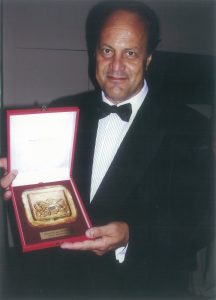
Award for Culture of Political Dialogue, Venice (2004). for the film “Syndrome Jerusalem”

Award at the Croatian Feature Film Festival in Pula (1995) for the film “Gospa”
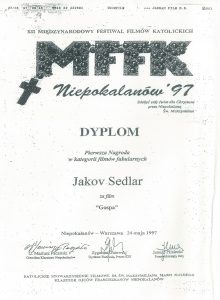
Warsaw, award for the best Catholic film in the world, 1994. for the film “Gospa”
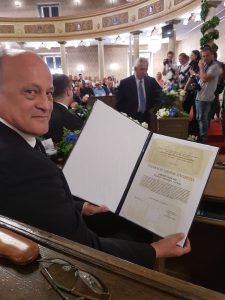
Award of the City of Zagreb 2017.
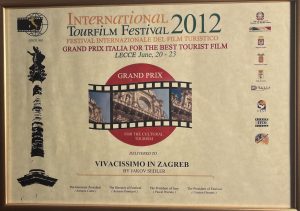
Grand Prix in Lecce 2012.
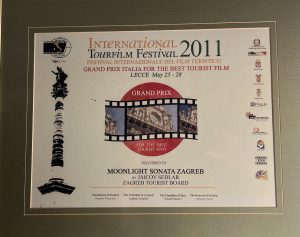
Grand Prix in Lecce 2011.
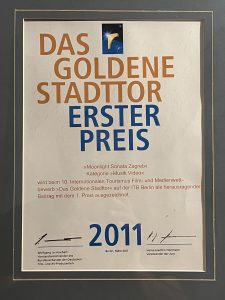
Grand Prix in Berlin 2011.
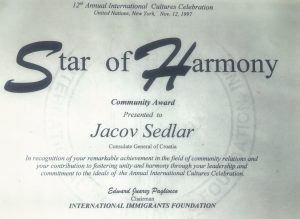
United Nations Award “Star of Harmony” (1997)
Sedlar worked with the best Croatian actors (Ena Begović, Tonko Lonza, Zlatko Crnković, Neva Rošić, Pero Kvrgić, Boris Miholjević, Ivo Gregurević, Mustafa Nadarević, Goran Navojec, Božidar Alić, Zrinka Cvitešić…) and international film stars (Martin Sheen, Charlotte Rampling, Michael York, Macualay Culkin, Gila Almagor, Nastassia Kinski, Armand Assante, Steven Spielberg, Peter Bogdanovich, Barry Morrow, Franco Nero, Kevin Spacey, …).
Jakov Sedlar has three children: Dominik, Marija and Emily.
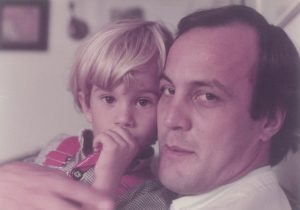
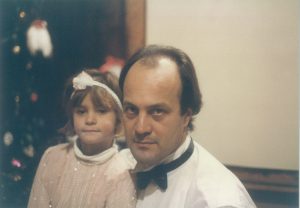
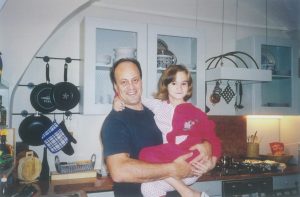
He works and lives between Zagreb, New York and Tel Aviv.
MUSIC VIDEOS
Moonlight Sonata (starring cellist Ana Rucner and dancer Azamat Nabiullin, 2010)
Linđo (starring cellist Ana Rucner and the Linđo Ensemble from Dubrovnik, 2011)
Romanca (starring cellist Ana Rucner, 2011)
Vivacissimo (starring pianist Marija Pranjić, 2011)
Zagreb voli Chopina – Zagreb Loves Chopin (with pianist Marija Pranjić, 2011)
Armand Assante voli Zagreb – Armand Assante Loves Zagreb (2011)
Zagreb – četiri godišnja doba – Zagreb: Four Seasons (2013)
CONTROVERSIES
Jakov Sedlar has been the most active and productive Croatian director and producer since the establishment of a democratic Croatia. He never received support from the Croatian state funds (except for the film “File of Four”) for the realization of his films. He received the necessary funds from investors and sponsors outside Croatia, especially from Israel and the USA. Due to his clearly expressed political position (the right of Croats to an independent Croatian state independent of any ties with the former Yugoslavia and the idea of a greater Serbia), he found himself as the target of criticism from left-wing media in Croatia. Most often, these were unfounded criticisms by extreme left-wing journalists (Jurica Pavičić, Ante Tomić, Boris Rašeta, Viktor Ivančić, Boris Dežulović, Nenad Polimac…), who did not care what kind of film Sedlar would make. They wrote at the very appearance of any title that it was a bad movie. He was oftentimes accused of historical revisionism, which is completely incorrect. He was falsely accused of reducing the number of victims in the Ustasha camp Jasenovac, which is completely incorrect. Everyone who saw the films “Jasenovac: The Truth” and “Century of Serbian terror in Croatia” could be convinced of that. Sedlar never reduced the number of victims but in the film he listed all the numbers that were in circulation from 1945 until today. Also, his critics accused him of falsifying information about the existence of the Jasenovac camp during the time of Tito and Yugoslavia. According to original documents discovered recently, it turned out that Sedlar was right.
Furthermore, the same critics tried to have him quarrel with friends in Israel, whom Jakov Sedlar truly has a lot of. Among them were some legendary Israelis: Ariel Sharon, Shimon Peres, Ezer Weizman, Rafi Eitan, Uri Dan, Ran Pecker, Yehudit Arnon, Gila Almagor, Jakob Agmon… In Israel, he made 19 films on the topic of Holocaust, all of which were shown in Tel Aviv, Jerusalem and Haifa.
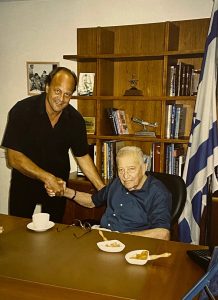
Ezer Weizman and Jakov Sedlar on the set of the film “Quater to Eight” about General Motti Hod
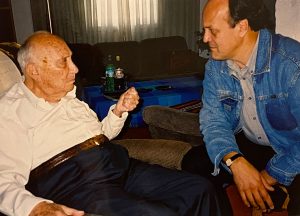
Meir Amit and Jakov Sedlar during the filming of the film “No More Heroes”, about Meir Amit, the legendary head of the Mossad
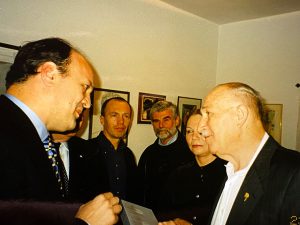
Motti Hod and Jakov Sedlar at the premiere of the movie “Quater to Eight”
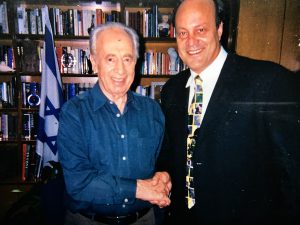
Shimon Peres and Jakov Sedlar on the set of the film “Jews and Croatia”
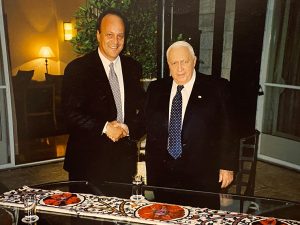
Ariel Sharon and Jakov Sedlar on the set of the movie “Jews and Croatia”
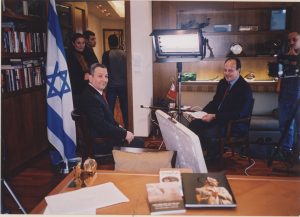
Ehud Barak and Jakov Sedlar on the set of the movie about Ehud Barak
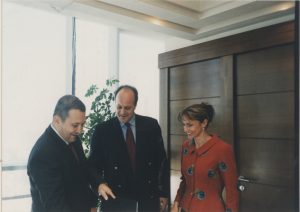
Ehud Barak, Almira Osmanović and Jakov Sedlar on the set of the movie about Ehud Barak
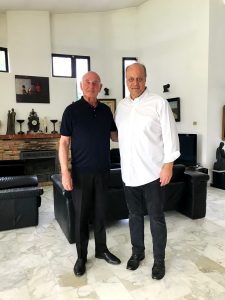
With Yaakov Pery, former head of Shin Beth service, after filming story about Rafi Eitan
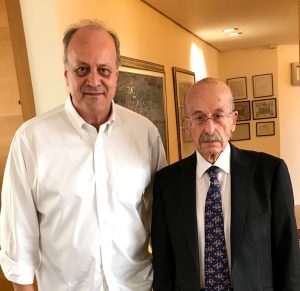
With Ram Kaspi after filming story about Rafi Eitan
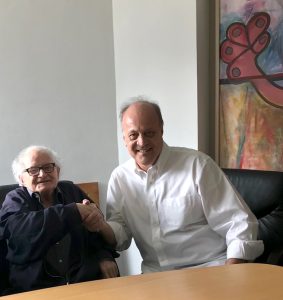
With legendary Mossad agent Rafi Eitan

With general Avigdor Kahalani
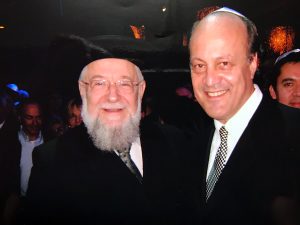
With Rabbi Lau
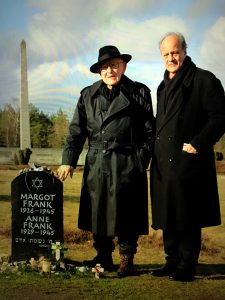
Nazi concentration camp Bergen Belsen: With Branko Lustig (Producer of “ Schindler’s list” and “Gladiator”)
